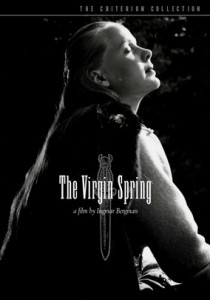The Virgin Spring-1960
Director Ingmar Bergman
Starring Max von Sydow, Birgitta Valberg
Top 250 Films #72
Scott’s Review #243
Reviewed May 15, 2015
Grade: A
The Virgin Spring is a quiet masterpiece by director Ingmar Bergman.
A Swedish film, it won the Best Foreign Language Oscar in 1960, which is surprising for such a dark film.
I have heard about this film for years, but it has eluded me until now. I am finally glad I viewed it. It is breathtaking and mesmerizing.
A unique film for many reasons, it inspired “revenge” films to follow, specifically The Last House on the Left and I Spit on Your Grave, which is a horror film, while The Virgin Spring is an interestingly artful film.
The film also explores morals, the main character’s religious beliefs, and the theme of guilt.
The film is shot in black and white, and the first thing that struck me about it was its gorgeous cinematography and lighting. The brilliant, deep contrast of black and white, with the illumination of a character’s face against a deathly black background, is bold and reminiscent of Citizen Kane (1941).
It gives the film warmth and glow that contrasts perfectly with the bleak subject matter.
The story of The Virgin Spring is a tragedy, yet the filming is so magnificent that it was not until the film concluded and I pondered the actual story that I realized just how horrific it truly is. And that is what Bergman was going for-provoking a thought.
This is not a film to watch while munching on a tub of popcorn. It is a film designed to prompt thought.
An affluent Swedish couple owns a farm and lives a peaceful, quiet existence. They are stellar members of their community and church. Although they are humble, they can afford to have servants.
They have a beautiful and pampered young daughter named Karin, who is sent to deliver candles to their church one sunny day. Karin is a trusting, virginal, and proper girl. She meets a trio of males- two adults and a young boy.
At first, gleefully sharing food with them and enjoying her newfound friends, they soon turn on her, and she is viciously raped, robbed, beaten, and murdered.
The look of surprise, pain, and horror on Karin’s face is monumental. As this occurs, a pregnant and spiteful servant, Ingeri, watches in horror from a hiding place. A rival of Karin’s, Ingeri, wanted misfortune to be thrust upon Karin, but as she sees in horror, her expressions portray regret.
As the family hopes and prays that they can find the missing Karin, the men and boy show up at the farmhouse in need of food and shelter.
Unbeknownst to the family, they are Karin’s rapists and killers, and once the truth is known, the once-sweet parents are out for brutal revenge. The young boy of the trio is guilt-ridden and physically sick from the circumstances.
Is the family’s revenge justified, or should they (as good Christians) forgive? This is the moral point of the story.
The conclusion is powerful as the father begs God for forgiveness. He questions his actions. But is he a changed man?
Bergman uniquely and intelligently shoots these scenes with only the father’s back in view as he throws his hands to leave. In these moments, we, the viewers, become one with the father, which makes for powerful storytelling.
Influential to many subsequent films, The Virgin Spring (1960) is a powerful tale reminiscent of a fairy tale that prompts viewers to reflect on its ending.
Subdued yet horrifying, it is meant to be viewed and analyzed.
Oscar Nominations: 1 win-Best Foreign Language Film (won), Best Costume Design, Black-and-White
